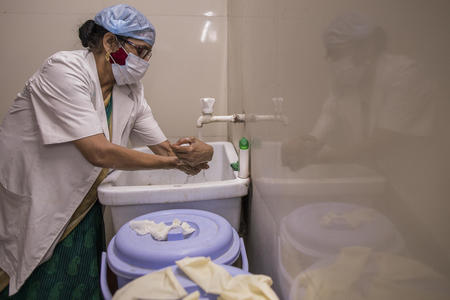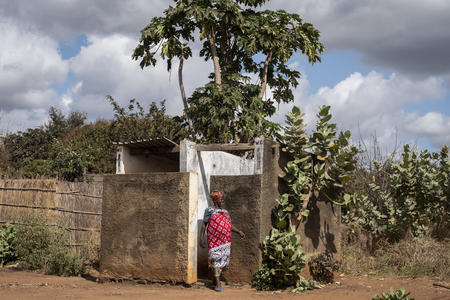Water, sanitation and hygiene in healthcare facilities is the cornerstone of resilient health systems and universal health coverage

Water, sanitation and hygiene (WASH) underpins human health and is essential to achieving universal health coverage (UHC). With the global health agenda resetting its focus and looking beyond pandemic response, it is crucial that WASH is an integral part of global efforts to achieve UHC and to build truly resilient health systems based on a solid foundation. This starts with a central cornerstone: universal access to WASH in healthcare facilities, say Alexia Knappmann and Kaoru Takahashi.
During this year’s World Health Summit in Berlin, the World Health Organization Director-General Dr Tedros Adhanom Ghebreyesus called on all countries for a re-orientation and a paradigm shift towards promoting health and preventing disease rather than spending millions on treating diseases that could be prevented for a fraction of the cost. “By and large, the world’s health systems do not deliver healthcare. They deliver sick care,“ he said.
However, healthcare facilities without access to clean water, safe sanitation and basic hygiene – defined in the latest JMP Report as access to hand hygiene facilities at points of care as well as toilets – cannot even safely take care of their patients. This leaves health workers – 70% of whom are women – unsafe and patients at risk of further, preventable infections while seeking treatment.
Achieving a paradigm shift towards promoting health and preventing disease requires a re-orientation of health systems towards primary healthcare as the foundation of UHC and it requires truly resilient health systems. As the global health community prepares for an important year for accelerating progress on UHC, delivering simultaneous progress towards universal access to WASH in healthcare facilities will be crucial for success. Luckily, there is cause for optimism.
UHC champion Japan’s G7 presidency is an opportunity
Japan will take over the G7 Presidency from Germany on 1 January 2023. The Japanese Government, a long-time champion on the issue of UHC, has already shown it is ready to meet the challenge of accelerating progress on UHC. Under their leadership, UHC was mentioned for the first time as a major health issue in a G7 Communiqué, the Ise-Shima Summit Declaration in 2016. For 2023 they chose UHC again as one of their top three priorities for the G7 health track. The G7 Health Ministers’ meeting is expected to set the tone for further discussions during the UN high-level meeting on UHC, scheduled for September 2023.
While it was disappointing that WASH was not mentioned under the UHC section of the 2016 G7 Declaration, the Government of Japan often mentions the important role of WASH for health in statements about UHC and the global health crisis. This international advocacy is important and should be received with open ears by the other G7 members because under the German presidency they finally recognised (PDF) “the importance of water, sanitation and hygiene (WASH) as a key element in AMR [antimicrobial resistance] prevention and response.”
Furthermore, the G7 committed (PDF) to "strengthening…the implementation of Infection Prevention and Control (IPC) programs…in particular for healthcare facilities, in line with the IPC minimum requirements identified by WHO”. The IPC minimum requirements referred to identify water, sanitation and hygiene as the first three minimum requirements when looking at the environment at the facility level, giving the Japanese G7 Presidency a clear mandate by member states to further WASH in healthcare facilities. The G7 is most effective as a catalyst for change when it builds on the work of previous presidencies, as Germany intended with its presidency; we hope Japan continues this tradition into 2023.
A goal to accelerate efforts to achieve more resilient, equitable and sustainable UHC
In June 2022, the Government of Japan launched a Global Health Strategy that articulates Japan’s effort for global health up to 2030. It has two policy goals – one of which is to accelerate efforts to achieve more resilient, equitable and sustainable UHC. In this strategy Japan again acknowledges the important role of WASH as “a sector with very strong links to health”.
It further emphasises that “improving water, sanitation, hand hygiene, ventilation and other hygiene behaviours, especially in healthcare facilities, is becoming increasingly important as a means of infection prevention, whose impact on health is significant. Based on this, efforts in these areas should be strengthened.”
With Japan holding the G7 presidency in 2023, a champion not only signalling ambition but also one of the largest bilateral WASH donors, we believe the Japanese Government can play a key role in accelerating global efforts to improve access to WASH in healthcare facilities through implementation of its Global Health Strategy and by influencing other governments at the G7 and ahead of the UN High-level meeting on UHC to invest in WASH in healthcare facilities.
In particular, Japan can:
- Leverage their G7 Presidency to influence global pandemic preparedness plans to prioritise catalytic funding, with the aim to close the coverage gap for WASH in healthcare centres in the poorest, least-developed countries by 2030.
- Acknowledging the strong link between WASH and the fight against antimicrobial resistance, support the integration of WASH as a core component in primary healthcare packages that are the foundation for UHC.
- Improve the tracking and transparency of WASH projects in bilateral and multilateral global health investments, especially in relation to health systems strengthening.
Investment in WASH in healthcare facilities is an essential best buy
This investment is critical to achieving UHC – because WASH plays a vital role in all four components of universal health coverage (PDF), for promotive, preventive, curative and rehabilitative services – but will also yield many additional health benefits. It helps health systems become more resilient and able to react to health and climate shocks, which will become more frequent as a result of climate change (PDF). It is simply a no-regrets investment. In these challenging times of multiple crises – with the world still dealing with the impacts of COVID-19, multiple conflicts, food and energy insecurity and climate change – this argument weighs heavy and it becomes evident that international development finance needs to be invested in high-impact interventions with multiplier effects. Investing in WASH in healthcare facilities does just that.
WASH in healthcare facilities is not only essential for UHC, but also vital to pandemic preparedness and response, halting the spread of antimicrobial resistance (AMR) and boosting maternal, newborn and child health. By breaking transmission cycles, WASH tackles the causes of many infectious diseases. Increased hand hygiene in healthcare facilities alone could prevent up to 50% of infections during treatment. Infections associated with unclean births account for 26% of newborn deaths and 11% of maternal mortality – together accounting for more than 1 million deaths each year. Approximately 20% of all global deaths are due to sepsis (about 11 million potentially avoidable deaths) and more than half of all health care-associated sepsis cases are preventable with safe WASH services as part of infection prevention and control.
Yet half of healthcare facilities globally and 68% in least-developed countries (LDCs) lack basic hand hygiene services. This means 3.85 billion people are exposed to the immediate risk of infectious disease transmission simply because they cannot wash their hands when working or being treated at their healthcare facility. Aspects of sanitation and water access at healthcare facilities in LDCs are equally alarming – only 20% have basic sanitation and 53% have basic water services.
The financial needs to fix this are modest compared with overall health and WASH spending. UNICEF and WHO have analysed the cost to achieve universal access to WASH in HCF in least-developed countries (LDCs) by 2030, finding it to be US$9.6 billion. Based on WaterAid analysis, $355 million a year of this should come from domestic revenue from LDCs and $600 million a year from external financing.
Most additional spending will be needed in non-hospital facilities and in rural areas, meaning efforts to meet WASH needs in healthcare facilities will contribute to the equity- and primary care-centred principles of the post-2015 development agenda for health and directly impact on progress in UHC.
2023 will hold many opportunities and high-level meetings to advance on UHC targets. But when all global discussions are over, it will be (primarily) healthcare facilities, as the foundation of UHC, that will be left to deliver on these political promises. However, as WHO director Maria Neira rightly pointed out: “A healthcare facility without water, sanitation and hygiene is not a healthcare facility.” So, it is time for countries to take a step back and look at the foundation on which they are building their health architecture. And it is time they fulfil their own promises to healthcare workers worldwide to equip them with the minimum requirements they need to be able to care for patients in a safe and dignified way.
Kaoru Takahashi is Executive Director of WaterAid Japan. Alexia Knappmann is WaterAid's Senior Advocacy Adviser – Germany Representative.
Top image: Bedriya Jemal, a health extension professional at Buriya Health Post, washes her hands with the water installed in her office after providing services to the people who visit the health post in Buriya Kebele, Gololcha District, Oromia Region, Ethiopia.





